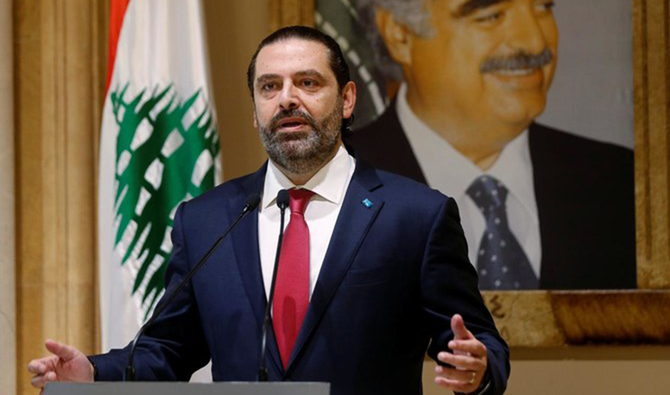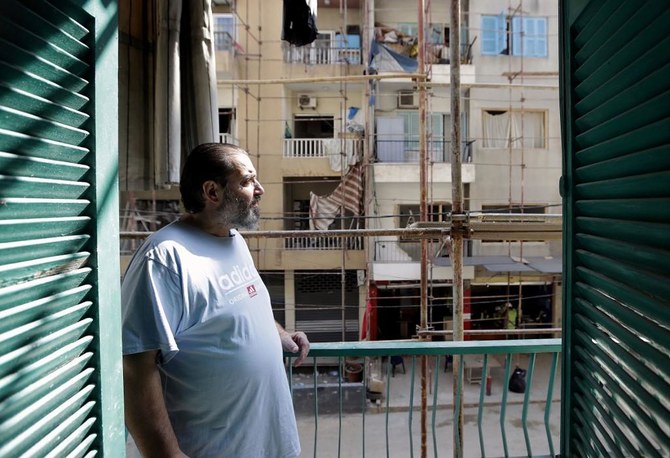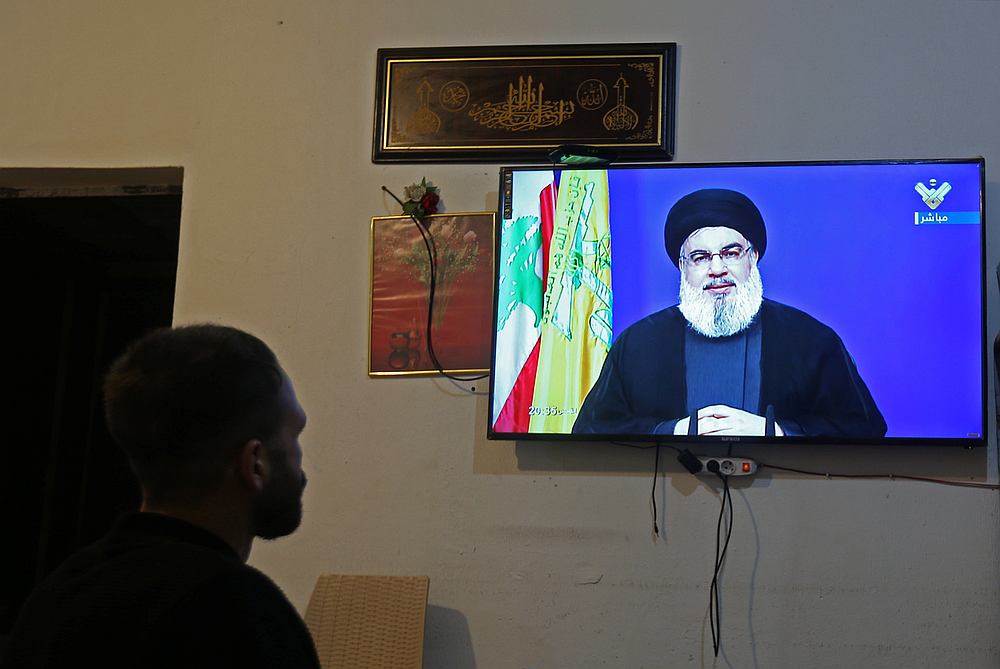by rt.com — The massive blast that destroyed a huge swathe of Beirut in August was one of the biggest non-nuclear explosions in history, releasing enough energy to power more than 100 homes for a year, new research has found. The devastating detonation was the result of the accidental ignition of approximately 2,750 tonnes of […]

by english.aawsat.com — Beirut – Asharq Al-Awsat Lebanon’s Maronite Patriarch Beshara al-Rai revived on Sunday debate over the demarcation of the Lebanese-Syrian border in the southern Shebaa Farms region. He made his remarks days after parliament Speaker Nabih Berri announced that a framework had been agreed upon to begin indirect US-mediated talks with Israel on land and maritime border demarcation, which will be led by the Lebanese army. “We should work to demarcate the borders with Syria in the area of Shebaa Farms to end the abnormal and ambiguous situation there,” the Patriarch said during Sunday mass.
Rai welcomed the framework agreement, which will allow Lebanon to restore its international border line in the South, facilitate the extraction of its maritime wealth of oil and gas, and end the series of attacks and wars between Lebanon and Israel, according to Resolution 1701 of the Security Council, which places it on a path of peaceful negotiation instead of fighting, without this implying a process of normalization. “On this occasion, an agreement must be found to resolve the issue of the presence of about half a million Palestinian refugees in Lebanon,” Rai continued, adding that through more resilience, Lebanon is bound to overcome its ordeals.

by Sunniva Rose — thenational.ae — Former cycling superstar Lance Armstrong toured Beirut on Sunday with over thirty amateur cyclists to raise funds for local NGOs working to assist victims of the August 4 blast. The ruined port remains an arresting sight, with buildings blown to pieces in the explosion that killed nearly 200 people and left 30,000 more homeless, leaving piles of rubble still being cleared by expert teams “I’ve never seen anything like that,” said Mr Armstrong, as he prepared to lead the peloton from the port to the offices of the Lebanese Red Cross, and then to Lebanese NGOs Heartbeat, Beit El Baraka, and Offre Joie. “The fact that only 200 people lost their lives, that’s a miracle,” he added.
Beirut is still reeling from the effects of the explosion of 2,750 tonnes of ammonium nitrate in its port. An investigation is ongoing, but in protests and on social media, the Lebanese accuse their leaders of being responsible for the unsafe storage of the chemical for seven years. “Disaster-stricken Lebanon” was trending on Twitter on Sunday. Mr Armstrong arrived in Beirut on Friday for a four-day visit, his first to the country, and visited the blast site the next day. Mr Armstrong told The National that his friend, American-Lebanese real estate investor Thomas Barrack, convinced him to visit Lebanon. “He asked me to come, I said absolutely,” said Mr Armstrong, who is scheduled to fly to Dubai on Monday for a four-day work trip. “Tom and I are on a longer trip in this part of the world and it just came together. Originally, we weren’t coming to Lebanon.” Lebanese Red Cross volunteer Oudey Hamadeh, 26, said he hoped Mr Armstrong’s visit would encourage donations. “At the start, there were a lot of funds and we hope that the funds will come back,” he said. “It’s been two months since the explosion and maybe people have lost interest in helping the Lebanese Red Cross.”

by arabnews.com — NAJIA HOUSSARI — BEIRUT: Saad Hariri could lead Lebanon’s government again amid proposals to bring him back, almost a year after he resigned as prime minister in response to mass protests about the country’s dire economic and financial situation. Mustapha Adib quit as prime minister-designate a week ago after failing to form a government of specialists independent from the parties in power. Lebanon desperately needs an international bailout and France, in particular, is urging politicians to begin much-needed reforms to deal with the grave problems facing the country.
Last week French President Emmanuel Macron gave leaders more time to form a government of specialists as part of an initiative to rescue the country. But key players are overriding some of the conditions set, notably Hezbollah and the Amal Movement who insist on keeping the finance portfolio and naming the Shiite ministers in the government. Two opinions prevail in Lebanon. One is that the government will not be formed before the US presidential elections in November. The other is that President Michel Aoun will soon set a date for parliamentary consultations, and the possibility of facilitating Hariri’s return to head the government is being proposed based on positive signs.
by newsmax.com — Tauren Dyson — President Donald Trump is in a dead heat with Democrat nominee Joe Biden, according to the latest John Zogby Strategies poll. Biden currently leads President Donald Trump 49%-47%, which is within the poll’s margin of errir, and 4% of likely voters unsure. The previous Zogby poll released Aug. 29 […]
The Daily Star— BEIRUT: The Lebanese pound fell against the dollar Saturday, trading at around LL8,750 on the black market, a day after Central Bank Gov. Riad Salameh said that the severe crisis was behind Lebanon. Black market exchangers were selling the dollar for LL8,800 and buying it for LL8,700. The dollar was trading for […]

by arabnews.com/node — NAJIA HOUSSARI — BEIRUT: Reconstruction is progressing slowly in the area of Beirut devastated by the Aug. 4 explosion in the Lebanese capital’s port. “The first obstacle hindering restoration work is financial. All private and official international bodies have no confidence in the Lebanese government so they’ve refrained from giving aid,” Jad Thabet, head of the Engineers Syndicate, told Arab News. “Any plan assumes the existence of a government, and the international campaign we saw when the explosion happened has withdrawn due to the political situation in Lebanon. Unfortunately there’s total chaos,” he said, adding that winter will make matters worse. “There are people who’ll be displaced and buildings that will collapse. The rain will wash away stones and soil, and block roads and sewers. There will be subsequent disasters for the people.”
The explosion of some 2,750 tons of ammonium nitrate that had been stored in Beirut’s port since 2013 killed 195 people, injured about 6,500, displaced 300,000 and caused billions of dollars’ worth of damage. Thabet said he intends to travel to Paris in an attempt to urge UNESCO to provide assistance to Lebanon, but he does not expect much in light of his country’s political situation. Many residents in Beirut are complaining about the lack of repairs to their damaged homes, and have no faith in the government. There is also a lack of progress on the judicial front, with Judge Fadi Sawan saying he “hasn’t yet received any report from any security service that was carrying out investigations in the explosion site.” Among the teams that helped with the investigations were a French one and an American one.

By KHALED ABOU ZAHR — Arabnews.com — On June 18, 1940, Gen. Charles de Gaulle made his famous radio appeal from London after the French Army was defeated at the start of the Second World War. It was the beginning of the French Resistance against Nazi occupation. He stood against the French Vichy government, which collaborated with the Nazis and became a client state. Today, any government in Lebanon is a “Vichy government” and the politicians have all become collaborators with the Iranian regime and its “high commissioner” in Lebanon: Hezbollah. As the country is being ravaged by the current occupation by Hezbollah and Iran following decades of Syrian occupation, I cannot help but wonder that shouldn’t it be time for a Lebanese leader to call for true resistance as De Gaulle did? Isn’t it time, as on the ground nothing can change, for a government in exile to be formed and an appeal made for all Lebanese to resist this occupation and its destruction of their country?
It is now clear, with the disappointing failure of the latest French initiative, that Hezbollah will not allow the formation of any government that has the capacity to question its actions — or, more precisely, that it does not completely control. Lebanon will continue to disintegrate into chaos while Iran gambles on a Joe Biden administration to formalize and legitimize its occupation. On the ground, no influential political voice will be left standing if it acts against Hezbollah’s plan. Yet, as we always wonder in election years, how will the next US president impact the Middle East? It is also time to understand that the US looks for strong allies. It cannot save Lebanon unless there are voices ready to fight and to resist. It is also important for the Lebanese not to be a tool or an accessory to any foreign influence. As a small country, it cannot be taken hostage as global powers and Middle Eastern powers fight. Our interests are in our citizens and the prosperity of the country — nothing more and nothing less. In this sense, former French President Jacques Chirac, who loved Lebanon and had pure intentions for the country, misguided Saad Hariri on France’s capacity to impose regional changes and this miscalculation accelerated Hezbollah’s control of the country in 2008. The Lebanese should not make the same mistake twice.

by catholicherald.co.uk — Thomas Caddick — Speaking in a dimly lit church, alongside a crucifix and the opening swell of the Allegretto from Beethoven’s 7th Symphony, a Wisconsin priest makes his case for why “you cannot be Catholic and be a Democrat” when voting in the US elections. Fr James Altman says in his video, which has reached many hundreds of thousands, that he has “crunched the numbers” to get an “approximation of how many Catholics voted for Obama in 2008 and 2012. Zero”. He tells “people masquerading as Catholics” who vote for pro-choice Democrats to “repent of your support of that party and its platform or face the fires of hell”, because there “will be 60 million aborted babies standing at the gates of heaven barring your Democrat entrance, and nothing you can ever say will ever excuse you for your direct or indirect support of that diabolical agenda”. He also condemns the Church hierarchy for “ripping on Trump”, the “best pro-life President and his Catholic wife”, and instead offering support to “criminal illegal aliens” and “godless communists”.
Needless to say, the message caused quite a stir. The priest’s local bishop, William Callahan of La Crosse, said he had begun the process of fraternally correcting Fr Altman: “Not in the bright light of the public arena, but as the Gospel dictates, in private.” Bishop Callahan briefly added that, whilst there was some “underlying truth” to Fr Altman’s video, the priest’s tendency towards “generalisation and condemnation” was wrong because Catholics “must never seek to divide, isolate and condemn”. But six days after the video’s release, Bishop Joseph Strickland weighed in with a very different message. “As the Bishop of Tyler I endorse Fr Altman’s statement in this video,” he tweeted. “My shame is that it has taken me so long.”
by rferl.org — Lebanon has asked Interpol to issue arrest warrants for the Russian captain and owner of the vessel that brought a shipment of ammonium nitrate behind a massive explosion at Beirut port in August. Lebanon’s state news agency NNA said October 1 that public prosecutors have asked Interpol to issue warrants against the […]



